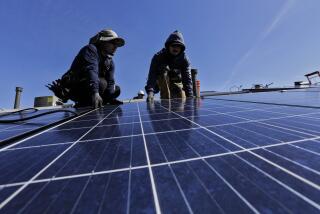Group Seeks to Stop Foreclosure in Solar Unit Dispute
- Share via
A homeowners group is seeking to prevent a bank from foreclosing on the home of a couple who say the $10,000 solar heating unit they bought doesn’t work.
The group is the Public Interest Homeowners Assn., which sued dozens of solar manufacturers, sellers and lenders last year, claiming hundreds of California homeowners were defrauded by faulty products and high-pressure sales tactics.
Lawyers for the group have won a temporary court order blocking any foreclosure on the home of Fred and Edna Straus by Orange-based Western Financial Savings Bank. The couple claim they were tricked into signing a second mortgage for equipment that, they claim, never functioned properly.
A full hearing at which lawyers will try to make the ban permanent is scheduled in the Orange County Superior Court case next week. The Strauses’ complaints echo those of many others against some firms in the solar industry, the subject of a sweeping investigation by state officials last year.
The Strauses bought a $10,000 solar unit from California Energy Bureau in 1983. They had assertedly been told that the unit would reduce their utility bills by 85 to 90% and would practically pay for itself.
Two weeks later a representative of the bank appeared at the Strauses’ West Covina home. According to a declaration by the Strauses, he told them that they had to sign loan papers because Western Financial had paid California Energy Bureau.
“We never sought out financing. We did not apply for any loan, nor did we ever visit or meet anyone from Western Financial until this visit where we were told we had to sign because Western Financial had already paid the vendor,” according to the statement.
While they paid $171.50 a month for three years, the Strauses claim the unit repeatedly malfunctioned. Their utility bills went up instead of down, they assert.
Despite repeated complaints, the system was never fixed, according to the couple. They stopped paying the bank in January, and when the bank sent a default notice, the homeowners group intervened.
Bank attorney Steven M. Schott said Western made a home improvement loan to the couple at their request and is not responsible for the allegedly fraudulent acts of the seller of the solar equipment.
Another bank used a similar defense last March when the group tried to stop foreclosures on more than 100 homes in Orange, Los Angeles and Riverside counties. Oakland-based Central Bank successfully claimed that it was exempt from state consumer protection laws in parallel situations because it had nothing to do with building or selling the defective solar equipment.
When a judge lifted a temporary order that had blocked foreclosures, lawyers for the homeowners group advised their members to pay up, according to Central Bank lawyer Stanley Doten. All of the homeowners either made up the back payments or made arrangements with the bank, and there were no foreclosures, according to both sides.
While Central Bank had hundreds of solar customers, Western has just “three or four” such loans outstanding, according to Senior Vice President Regan Kelly. The total amount of loans outstanding on solar equipment is $26,000, Kelly said.
“We’re aware of the problems people have had with the solar equipment, and we’ve tried to be as accommodating as possible,” Kelly said. “At the same time, our business is separate from the solar sales.”
Kelly said the Strauses’ loan has been delinquent for nine months.
Melvin Teitelbaum, lawyer for the Public Interest Homeowners Assn., said the Straus case is typical. The couple got equipment that doesn’t work, for which the bank continues to demand payment.
“This is the general situation in which the lender should be held to be responsible for whatever liability we could have had against the seller,” Teitelbaum said.
But Schott said California consumer protection laws apply to the seller, not the lender.
“Western Financial has no relationship or connection with the seller of the solar unit in question,” Schott said. The law makes the lender responsible for the seller’s actions only when there is “a direct relationship, such as common ownership or interest, and that’s not the case here,” Schott said.
The case is set for a hearing before Superior Court Commissioner Julian Cimbaluk on Oct. 12.
More to Read
Inside the business of entertainment
The Wide Shot brings you news, analysis and insights on everything from streaming wars to production — and what it all means for the future.
You may occasionally receive promotional content from the Los Angeles Times.










